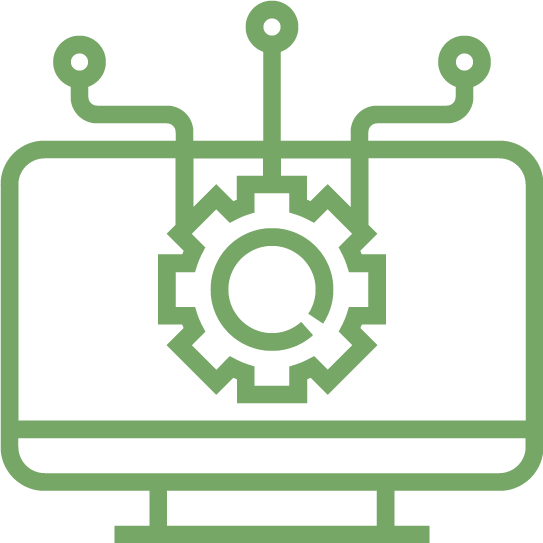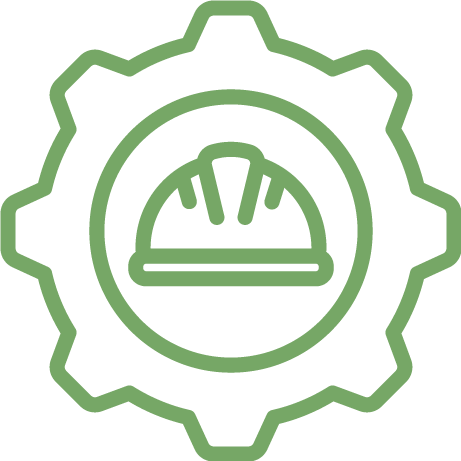Our Industry business unit encompasses
Space & Defence; Materials, Testing & Innovation (MTI), and
Cybersecurity. We were pleased with the results from 2021, doubling
contribution margin compared with 2020. We showed resilience in another year
blighted by the pandemic and refined the way we work with partners, suppliers
and customers, which has given us an even stronger baseline for growth looking
forward. People are our assets and they have shown, once again, superb ability
and resilience to deliver in challenging conditions.
Some highlights from the year include the
implementation of an agile innovation scheme, which brought together colleagues
to think and create new services that will support further growth in our
business. The result was seven new solutions, some completely new and some
existing services that have been re-shaped or repositioned.
We also implemented a central Business
Development team, working across all divisions within the industry business
unit to foster transference of knowledge and technology.

We completed the strategic acquisition of the hardware and software systems engineering company, Interconsulting Engineering. This highly skilled and competent team received the Service Excellence award from Leonardo for the work they did in 2021.

productive hours on Space and Defence activities
(+24% from 2020)

productive hours on Space Projects
(+50% from 2020)

productive hours on
Security and Cyber Security projects
(+27% from 2020)

productive hours on Avionics Projects

productive hours on
System Engineering
(+45% from 2020)
productive hours on
Training and Learning Solutions projects
(in line with 2020)

productive hours on
Safety projects
(+35% from 2020)

contribution Margin
(23.6% in 2020,
20% in 2019)
productive hours on
Training and Learning Solutions projects
(in line with 2020)
productive hours on
Training and Learning Solutions projects
(in line with 2020)
Interconsulting has brought us leading edge competencies and skill sets in mission and safety critical systems and new services for consultancy, system design and prototyping for the Aerospace & Defence market, enabling the design and development of safety critical integrated solutions.
In the UK, we were presented the Gold Award under the Ministry of Defence Employer Recognition Scheme. As one of only around 400 companies to receive this honour in 2021, the award reflects a commitment to support the defence and armed forces community and recruit ex-forces personnel into the business. It reflects RINA’s desire to support and recruit highly knowledgeable and experienced personnel into its defence business. We have also grown our presence in The Netherlands, an important strategic market for our S&D division.
2021 saw a strong restart of the manufacturing ecosystem after a tough year in 2020 because of the pandemic. We had an especially good year in the steel sector and have reinforced cooperation with main producers worldwide, including the opportunity to restart our relationship with Ilva S.p.A., the biggest steel plant in Italy, with an important contract to support meeting its research, development and innovation targets. Steel production has been boosted by a strong demand for material across different manufacturing areas and we have been able to continue project delivery even with the restrictions of the pandemic, using our now well established remote working practices.
We started a flagship project to introduce an Internet of Things (IoT) safety solution, “Safety@Work”, aimed specifically at industries where risks are higher, including steel, construction and oil & gas. We also released a new cloud-based tool for customers to access our consultancy services, “AccessRINA”, increasing our agility to respond to demands. We further released a new cloud tool, ‘CAEUp’, capable of morphing and adapting a nominal CAE model on the real produced shape.
CAEUp is a virtual bridge between design and manufacturing. It improves overall manufacturing process efficiency and checks quality in a data-driven, standardized process. The user can then perform several numerical simulations to consider crucial aspects of the component quality, such as structural analysis and mechanical performance. This important digital tool can be applied in a wide variety of industries and is an important step in enhancing efficiency and sustainability of manufacturing processes.
We have seen a lot of success from the Projects of Common European Interest in areas such as ‘green’ steel production and are actively supporting many organisations in submitting their projects to the EC. We are very optimistic about some large projects in implementing complete new value chains, especially in energy and hydrogen economies.
There are many investments in energy transition, with manufacturing and industry sectors setting up their plans to reach 2030 and 2050 decarbonisation targets. Our advanced laboratory capabilities, able to test and pilot full industrial activities, has placed us in a very strong position to support these efforts. Of particular importance is our ability to test materials and equipment for use with hydrogen, which is a more aggressive fuel than natural gas. Indeed, the global demand for this service led us to almost double our laboratory capacity and we now have even more capacity to fulfil market requests in this area.
In the traditional energy sector, we saw a rise in investment by major producers, requesting support for innovative solutions, advanced materials and safety. Our ability to provide full scale testing of equipment to ensure it is safe and fit for application has delivered us many projects from regions including Middle East, Americas and Europe.
Our acquisition of Cyber Partners in October 2021 forms the basis of our new Cybersecurity division, a business in which we have strong ambitions for the coming years. It enlarges our presence in cybersecurity and gives us a wide portfolio of services including consulting and advisory services in all aspects of governance, risk and compliance. In December we also engaged a new team of offensive security hackers to provide advanced services for assessing and quantifying exposure to cyber risk: Cyber Security Posture Assessment and Cyber Risk Quantification.
We have ambitious targets for the coming
year for around 44% growth in revenue. We will continue to strengthen our
presence in UK, Italy, China and The Netherlands and are working closely with
HR to appeal to and retain new talent.
We are very excited about a project from
the Next Generation EU (NGEU) instrument to fund green steelmaking. For this
and other important projects, we are looking to recruit 380 new colleagues,
taking the total number of employees of the Industry business unit to around
1,000. We will focus on both organic and inorganic growth, continuing to
actively scout for new acquisitions that will provide strategic and culture fit
for our business.
We will continue to focus on developing key
account relationships with tier 1 organisations and work with the newly formed
business development team to provide end-to-end services underpinned by
innovation.
Energy and digital transformation are
megatrends for the coming years, and we are ready to support clients in achieving
their goals in these areas. We have invested in our brand and will continue to
grow the skills, capabilities and wide range of services we offer.
Detection of structural issues for Vega Launcher Mobile Gantry
In a project which started in 2018, RINA has designed, implemented and tested a SHMS for the mobile gantry of the Vega Launcher. The system, which detects the onset of structural issues on gantry bearings and unbalancing anomalies during transportation, was successfully installed and tested at the Kourou CSG in November 2021.
The system provides a modular architecture which collects and stores data from around 100 different sensors on the gantry and computes statistical information. It enables easy modification and sensor configuration and has been designed so additional modules can be added in the future to accommodate new sensors or provide more in-depth statistical and predictive analysis.
Protecting homeland, coastline and offshore assets
To protect homeland, coastline and offshore assets, the MCDS project provides Qatar Armed Forces (QAF) with a set of Coastal Defence Systems (CDS) coordinated by a Fixed Control Centre (FCC). Each CDS is a mobile and configurable weapon system that integrates several subsystems, including a Mobile Control Unit (MCU), Mobile Sensor Unit (MSU), and a Firing Unit to cover long range (EFU) and medium range (MFU). Each MCU can obtain naval and surface surveillance, Threat Evaluation & Weapon Assignment and Mission Planning, and guarantee interoperability with the high-level FCC.
RINA supported integration activities to enable formal acceptance of the system in factory tests (FAT). It demonstrated its ability and experience in the integration of complex defence systems both at customer sites and the military base.
A complete QA surveillance service
In a project that was awarded in June 2021 and runs until December 2023, RINA is providing a complete program of QA surveillance of low-risk suppliers for Leonardo Helicopters. The program complements the main audit program of medium- and high-risk suppliers, performed directly by the Supplier Quality Assurance (SQA) of Leonardo Helicopters.
RINA was awarded this important international contract because of the competencies it has, its expertise in quality, and strong organisational and communication skills, and knowledge in international regulations, customer quality requirements and airworthiness.
Design and development of an onboard airborne trainer avionic computing platform
Launched in April 2021, this project involves the creation of an onboard computing platform to host ‘real time’ software applications for tactical scenario simulations. It includes the development of software, shipment of avionic box prototypes, and equipment for preliminary flight integration.
The project was awarded based on the technical specification to address the specific need for the customer to install tactical scenario simulation capability onboard airborne trainers. Dedicated to the Aircraft Defence Italian Market, the first objective is to train pilots to use aircraft mission capabilities (Attack Control Systems, Sensors, Displays) through the simulation of complex tactical scenarios in real time.
An interdisciplinary team, including hardware, software and avionic system engineers, have been involved in the design and development of the Simulation Box equipment, which is unique to Interconsulting Engineering, now part of the RINA group. The project will enable the customer to autonomously use the avionic box platform to port simulation capabilities developed in house.
Complex simulation algorithms for the animation of Computer Generated Forces (CGF)
In 2021, RINA Mission Systems (Interconsulting Engineering) was awarded a contract to develop complex simulation algorithms of CGF for Leonardo Aircraft Division. CGF populate virtual simulation scenarios to train military pilots to move in tactical scenarios and face attacks against virtual elements to increase their ability to face different combative situations.
In the first project that combines competencies and experience from Interconsulting Engineering and RINA Consulting, 3D models of aircraft have been developed which can be piloted by an operator or fly autonomously. Interconsulting Engineering developed the CGF in house. In a multidisciplinary team, RINA provided aeronautical and AI software skilled engineers. The AI capabilities applied to the aircraft simulation provides cutting edge technology and affords Leonardo with enhanced competitiveness of their airborne trainers, which are now able to provide increasingly intelligent and less predictable enemy scenarios and virtual entities. For RINA Mission Systems, it shows its world-leading expertise in technology for the advanced training of pilots.
Identification of technologies to reduce environmental impact and related financial instruments to support them
During 2021, RINA was contracted by a primary steel transformer to carry out technological observations of the environmental impact of steel treatments, with the aim to reduce GHG emissions at its plant in Ravenna, Italy. The focus of the project was on alternative low-emission heating systems for galvanizing and painting lines.
Technologies evaluated included CO2 capture and sequestration, transition to hydrogen burners, and electromagnetic induction heaters. For each possible solution, funding instruments were also identified from the ones currently available and those that may be launched in connection to PNRR.
A technical and economic feasibility study of Italian industry for the substantial reduction or elimination of the use of fossil fuels
Ricerca sul Sistema Energetico (RSE) has commissioned RINA to provide a technical and economic feasibility study for the decarbonisation of industrial operations and a systematic transition to hydrogen as an energy vector. The study aims to assess the feasibility and effectiveness of increasing energy efficiency, reducing consumption, and, ultimately, decarbonising the Italian industrial system. It considers the replacement of fossil fuels with new energies and the widespread introduction of digital and automation technologies (Industry 4.0) to enhance production efficiency, quality and competitiveness. The study will highlight the benefits of technologies in terms of energy efficiency and environmental sustainability and includes the analysis of current and possible imminent processes.
Experimental feasibility investigation for energy transition
A one-year project that finished in July 2021 undertook experimental investigation of the feasibility of using hydrogen and natural gas blends in existing industrial burners for forging metallic materials. The burners had not originally been designed for use with hydrogen and the project aimed at establishing their use in decarbonising energy-intensive industries such as the steel industry without the huge cost and time associated with installing new units specifically designed for use with hydrogen and hydrogen-natural gas mixtures.
RINA evaluated industrial scale performance of the burners in laboratory tests to establish the working window with different hydrogen/natural gas mixtures, their efficiency, and emission levels. It further used its metallurgical expertise to evaluate the effect of introducing hydrogen on the thermally treated steel. A field test was then carried out at the GIVA Group forging plant in Milan using 30% hydrogen and 70% natural gas. The project demonstrated the viability of using existing burner technology in decarbonisation.
Creating a reliable, open ecosystem for innovation
Running from May 2020 until April 2023, the PITCCH project aims to establish an ecosystem to promote collaboration between SMEs, providing radical market innovations, and large enterprises to foster innovation and the adoption of advanced technologies. The digital platform being provided will enable members to find potential partners and manage the demands for brokerage services. RINA affords its expertise in technology analysis and foresight across sectors such as photonics, nanotechnology, micro/nanoelectronics, industrial biotechnology, advanced materials and manufacturing, and digital technologies. It is providing innovation management in terms of research objective definition, IPR management, and intellectual rights licensing expertise to support this vital project for open innovation.
Centre of excellence for the design and implementation of sustainable technologies and production of special steels
The TecSpAS project commenced in July 2021 and is aimed at addressing the development of high-performance magnetic steels for use in the new generation of electric motors for electric and hybrid vehicles. It will develop metallurgical models for the prediction of microstructure and mechanical properties during the continuous annealing process used in the production of special steels. The project aims to reduce energy usage and emissions through the development of innovative Ultra Rapid Induction Heating in a pilot line. The metallurgical models will simulate recrystallisation and grain growth phenomena and the mechanical characteristics of the material produced.
RINA is providing its expertise and knowledge in metallurgy, the chemical-physical mechanisms that are the basis for the production of advanced electrical steels, and metallurgical product and process modelling.
Independent position, velocity and timing (PVT) and safety-of-life services
GALILEO is the European funded GNSS to provide member states with PVT and safety-of-life services based on an independent system. RINA is supporting ESA and Thales Alenia Space in the security design of the classified portion of the GALILEO ground segment and services, in particular the provision and exploitation of the Public Regulated Service (PRS) service by Member States. In a contract awarded by Leonardo, RINA is developing the point of contact platform (POCP) to provide Member States with the entry point to the GALILEO system.
By the end of 2021, RINA reached a consolidated point of development of the POCP and, at the request of Leonardo, has diverted some of the project team resources to support the development of functionality for the Galileo Security Monitoring Centre managing CONFIDENTIAL EU and SECRET EU information related to the management of PRS services and security functionalities on the system side.
Definition of new paradigms to improve engineering quality
Working since 2016, RINA continues to support Fincantieri to define new paradigms to improve the quality of engineering. This includes the “Design Support Process” and other processes and organisational analyses to support production and functional design.
The Design Support Process provides Fincantieri with a tool that enables more efficient and effective working by reducing transit times and critical issues, and organising work context to promote and facilitate information exchange. The automated process reduces manual design activities and integrates with SAP ERP platform. The project aims at guaranteeing control and monitoring of internal and external work and reducing the amount of rework required during construction.
Review of framework used by the European Space Agency (ESA) for the calculation and evaluation of environmental impact
During 2021, RINA provided consultancy services to review the framework used by ESA to assess environmental impact of the space sector. This includes ESA’s methodological manual, software for environmental impact assessment, and the database containing the datasets developed for the space sector. RINA performed a critical review of these elements and provided specific recommendations for improvements.
Sustainable nanofabrication
An EC project, SUSNANOFAB is a Coordination and Support Action aimed at building a robust and sustainable nanofabrication network that tackles the missing links between policy, infrastructure, expertise and industry requirements worldwide. Nanofabrication is the design and manufacture of structures of nanometre dimensions. It has the potential to make a significant contribution to top EC priorities, including those stated within “A European Green Deal”, “An economy that works for people”, “A Europe fit for the digital age” and “Next Generation EU”. It has the potential to provide affordable healthcare, higher standards of living, high quality consumer goods, cleaner energy and transport.
The SUSANOFAB project is committed to delivering an EU-wide strategic roadmap to foster nanofabrication research and market uptake, with planned international cooperation activities with US and other countries on pre-competitive themes such as standardization and regulation, education and training, safety and sustainability.
At an operational and end-user level, the project will develop an Open Access Digital Platform that interoperates with current platforms, projects and other initiatives at the European level. The project also includes a set of brokerage and training services especially focused for industries and SMEs.
RINA and its partners will provide expertise in strategic road mapping, innovation management and technology transfer, along with technical expertise in modelling, manufacturing and training characterisation.
Utilising green hydrogen to reduce the environmental impact of steel production
The DEVH2forEAF project started in July 2021 and is scheduled to run until the end of 2024. It is a collaborative project, involving steel producers, steel plant suppliers, research centres and universities, based on using innovative hydrogen burners to replace the use of natural gas in an Electric Arc Furnace (EAF) plant.
RINA is the project coordinator and its RINA-CSM site in Dalmine will be used for the experimental test. The project will set up and test oxy-combustion burners fed with various fuels, including hydrogen, syngas, and natural gas in a pilot scale combustion chamber. First industrial trails will then be carried out at the Pittini steelworks in Italy, and secondly at CELSA steelworks in Spain. The project aims to establish the feasibility of using green hydrogen to reduce the environmental impact of steel production.
EPD for cement products
RINA has been employed by COLACEM, the third largest cement producer in Italy, for Life Cycle Assessment (LCA) and EPD certification of six of its products. RINA also provided support to COLACEM during documental and on-site audits, solving the recommendations and non-conformity issues identified by the verification body. RINA will further carry out annual checks of the LCA results for re-calculation of impacts and amendment of LCA studies and EPD report to maintain certification.
Supporting the quick transition to “eco-compatible” steel production
In a two-year project commencing in April 2021, RINA is supporting ADI with its strong competencies in steel making and its applications, permitting and engineering management, innovation management, technology transfer, and its capacity to establish funded projects. The new ADI R&D centre will lead decarbonisation for the business and RINA is supporting both training of young engineers and laboratory set-up activities.
The project scope includes training of new staff at the R&D centre, laboratory design and selection of instruments, on-the-job training on process/product development and methodology for failure analysis for identification of defect causes and possible countermeasures. It includes product/process development projects for hot-dip galvanising of coils for the automotive sector and high thickness/strength sheet metal for infrastructures.
Capturing market opportunities for safe transportation of hydrogen for decarbonisation
In a project which ran throughout 2021, RINA performed experimental evaluation of material fracture resistance following “Option B” design requirements of the code ASME B31.12. for Corinth Pipeworks SA (CPW). The qualification requires long-term exposure and analysis of artificially pre-cracked materials under high pressure with 100% hydrogen and reproduces real operating conditions. The test requirements are a fundamental step in qualifying transmission line pipe as hydrogen-ready and is vital to establish infrastructure for the use of hydrogen in decarbonisation efforts.
RINA is one of the few companies in the world with the skills and laboratories capable of evaluating materials and components with hydrogen up to 1,000 bar. The project involved metallurgy and fracture mechanics experts in combination with advanced laboratory competencies.
